2022-06-16

Veteran British freelance journalist Dom Phillips and respected Brazilian Indigenous expert Bruno Pereira shared a passion for the farthest reaches of the Amazon rainforest, where they went missing and were buried, according to a confession obtained by police.
The pair were last seen early on June 5 traveling by boat in Brazil's Javari Valley, a far-flung jungle region near the border with Peru, where Phillips was researching a book.
The region has seen a surge of criminal activity in recent years, including illegal logging, gold mining, poaching and drug trafficking -- incursions Phillips has reported on and Pereira has vigorously fought.
Police said Wednesday that one of two men arrested over their disappearance admitted to having buried their bodies in the jungle. While human remains have been found, they have not been definitively confirmed to be those of Pereira and Phillips.
The two had already traveled there together in 2018 for a feature story Phillips wrote in British newspaper The Guardian on an uncontacted tribe -- one of an estimated 19 in the region.
"Wearing just shorts and flip-flops as he squats in the mud by a fire, Bruno Pereira, an official at Brazil's government Indigenous agency, cracks open the boiled skull of a monkey with a spoon and eats its brains for breakfast as he discusses policy," it began
.
That memorable introduction neatly sums up both men, courageous adventurers who loved the rainforest and its peoples, each defending the Amazon in his own way.
- 'Sharp, caring journalist' -
Phillips, 57, started out as a music journalist in Britain, editing the magazine Mixmag and writing a book on the rise of DJ culture.
Lured by DJ friends, he set off for Brazil 15 years ago, falling in love with the country and the woman who became his wife, Alessandra Sampaio -- a native of the northeastern city of Salvador.
Reinventing himself as a foreign correspondent, Phillips covered Brazil for media including The New York Times, The Washington Post, Financial Times and The Guardian, where he was a regular contributor.
A group of friends and colleagues described Phillips as "one of the sharpest and most caring foreign journalists in South America."
"But there was a lot more to him than pages and paragraphs. His friends knew him as a smiling guy who would get up before dawn to do stand-up paddle. We knew him as a caring volunteer worker who gave English classes in a Rio favela," they said in a statement.
Phillips traveled in and wrote about the Amazon for dozens of stories, winning a fellowship from the Alicia Patterson Foundation last year to fund his project to write a book on sustainable development in the rainforest.
The project took him back to the region he loved.
"Lovely Amazon," he posted on Instagram earlier this month, along with a video of a small boat winding down a meandering river.
- 'Courageous, dedicated' Indigenous advocate -
Until recently working as a top expert at Brazil's Indigenous affairs agency, FUNAI, Pereira was head of programs for isolated and recently contacted Indigenous groups.
As part of that job, the 41-year-old organized one of the largest ever expeditions to monitor isolated groups and try to avoid conflicts between them and others in the region.
Fiona Watson, research director at Indigenous rights group Survival International, called him a "courageous and dedicated" defender of Indigenous peoples.
Pereira was especially revered for his knowledge of the Javari Valley, where he was also FUNAI's regional coordinator for years.
But he was on leave from the agency after butting heads with the new leadership brought in by far-right President Jair Bolsonaro, who faces accusations of dismantling Indigenous and environmental protection programs since taking office in 2019.
Pereira "was effectively forced out at FUNAI, basically because he was doing what FUNAI should be doing and have stopped doing since Bolsonaro took office: standing up for Indigenous rights," Watson told AFP.
Pereira frequently received threats for his work fighting illegal invasions of the Javari reservation.
That includes helping set up Indigenous patrols. He and Phillips were on their way to a meeting on one such patrol project when they disappeared.
"Every time he enters the rainforest, he brings his passion and drive to help others," Pereira's family said in a statement.
msi-mel/wd/bfm

That memorable introduction neatly sums up both men, courageous adventurers who loved the rainforest and its peoples, each defending the Amazon in his own way.
- 'Sharp, caring journalist' -
Phillips, 57, started out as a music journalist in Britain, editing the magazine Mixmag and writing a book on the rise of DJ culture.
Lured by DJ friends, he set off for Brazil 15 years ago, falling in love with the country and the woman who became his wife, Alessandra Sampaio -- a native of the northeastern city of Salvador.
Reinventing himself as a foreign correspondent, Phillips covered Brazil for media including The New York Times, The Washington Post, Financial Times and The Guardian, where he was a regular contributor.
A group of friends and colleagues described Phillips as "one of the sharpest and most caring foreign journalists in South America."
"But there was a lot more to him than pages and paragraphs. His friends knew him as a smiling guy who would get up before dawn to do stand-up paddle. We knew him as a caring volunteer worker who gave English classes in a Rio favela," they said in a statement.
Phillips traveled in and wrote about the Amazon for dozens of stories, winning a fellowship from the Alicia Patterson Foundation last year to fund his project to write a book on sustainable development in the rainforest.
The project took him back to the region he loved.
"Lovely Amazon," he posted on Instagram earlier this month, along with a video of a small boat winding down a meandering river.
- 'Courageous, dedicated' Indigenous advocate -
Until recently working as a top expert at Brazil's Indigenous affairs agency, FUNAI, Pereira was head of programs for isolated and recently contacted Indigenous groups.
As part of that job, the 41-year-old organized one of the largest ever expeditions to monitor isolated groups and try to avoid conflicts between them and others in the region.
Fiona Watson, research director at Indigenous rights group Survival International, called him a "courageous and dedicated" defender of Indigenous peoples.
Pereira was especially revered for his knowledge of the Javari Valley, where he was also FUNAI's regional coordinator for years.
But he was on leave from the agency after butting heads with the new leadership brought in by far-right President Jair Bolsonaro, who faces accusations of dismantling Indigenous and environmental protection programs since taking office in 2019.
Pereira "was effectively forced out at FUNAI, basically because he was doing what FUNAI should be doing and have stopped doing since Bolsonaro took office: standing up for Indigenous rights," Watson told AFP.
Pereira frequently received threats for his work fighting illegal invasions of the Javari reservation.
That includes helping set up Indigenous patrols. He and Phillips were on their way to a meeting on one such patrol project when they disappeared.
"Every time he enters the rainforest, he brings his passion and drive to help others," Pereira's family said in a statement.
msi-mel/wd/bfm
Dom Phillips and Bruno Pereira: Brazil police find two bodies in search for missing men
Police chief says one of the men arrested in connection with the pair’s disappearance had confessed to killing them
Police chief says one of the men arrested in connection with the pair’s disappearance had confessed to killing them
Dom Phillips and Bruno Pereira went missing on 5 June, at the end of a four-day trip down the Itaquaí river in the far west of Brazil. Composite: João Laet/AFP/Getty Images (left); Daniel Marenco/Agência O Globo (right)
Andrew Downie in São Paulo and Tom Phillips in Atalaia do Norte
Andrew Downie in São Paulo and Tom Phillips in Atalaia do Norte
THE GUARDIAN
Thu 16 Jun 2022
Police in the Brazilian Amazon have found the bodies of two men in the area close to where British journalist Dom Phillips and Indigenous activist Bruno Pereira went missing 10 days ago.
At a press briefing late on Wednesday, regional police chief Eduardo Fontes said one of the two men arrested in connection with the pair’s disappearance had confessed to killing them.
“On Tuesday he informed us the location where the bodies were buried and he promised to go with us today to the site so we could confirm where the bodies were buried,” Fontes told reporters.
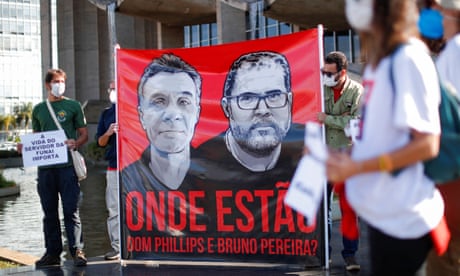
The disappearance of Dom Phillips and Bruno Pereira
The announcement brought a sad end to a 10-day search which has horrified the nation and underlined the growing dangers faced by those who dare to defend Brazil’s environment and Indigenous communities, which have faced a historic assault under the country’s far-right president, Jair Bolsonaro.
The location identified by the suspect was 1hr 40min by boat from the river town of Atalaia do Norte and another 3.1km (1.9 miles) by foot into dense forest.
After a day-long operation, involving the army, navy and police force, the Guardian witnessed the bodies being removed from that area, known as the Lago do Preguiça, under the cover of darkness.
Escorted by army troops, they were carried by boat back down the River Itaquaí to Atalaia do Norte, where Phillips and Pereira had begun their final journey.
Scores of locals flocked to the town’s port to watch as officers in camouflage gear loaded the two black body bags on to the back of a federal police vehicle, which set off in a blaze of red and blue lights.
“We are now going to identify the human remains with the most dignity possible,” Fontes said. “When the remains are proved to be those of Dom Phillips and Bruno Pereira, they will be delivered to the families.”
The news was greeted with relief by Phillips’ wife Alessandra Sampaio.
“Although we are still awaiting definitive confirmations, this tragic outcome puts an end to the anguish of not knowing Dom and Bruno’s whereabouts,” she wrote in a statement. “Now we can bring them home and say goodbye with love.
“Today, we also begin our quest for justice. I hope that the investigations exhaust all possibilities and bring definitive answers on all relevant details as soon as possible.”
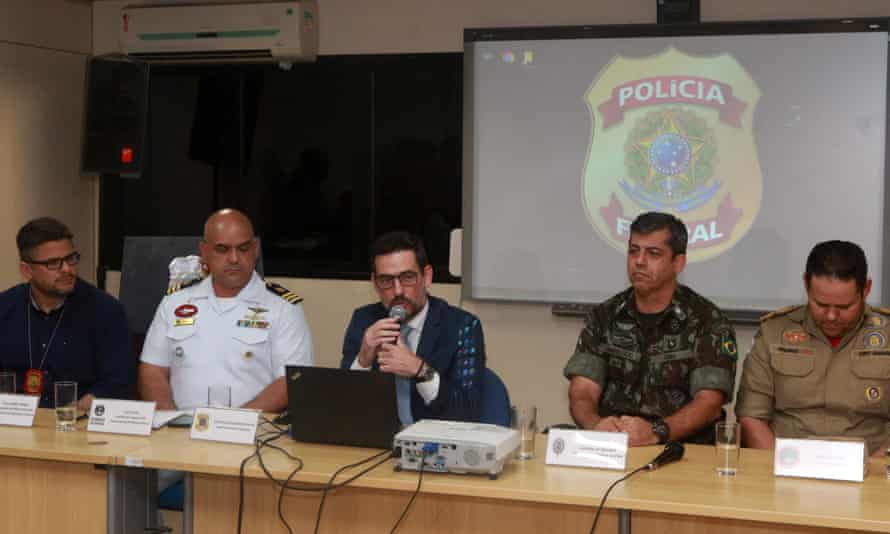 Superintendent Eduardo Alexandre Fontes speaking during a press conference in Manaus, Amazonas state. Photograph: Ricardo Oliveira/AFP/Getty Images
Superintendent Eduardo Alexandre Fontes speaking during a press conference in Manaus, Amazonas state. Photograph: Ricardo Oliveira/AFP/Getty Images
Fontes said search teams planned to return to the site on Thursday to locate the men’s boat. The men were last seen travelling upriver and Fontes alleged the suspects tossed the boat’s engine in the river and then filled the vessel with sacks of earth so it would sink.
“We are still investigating,” he said, adding that more arrests were expected. “This was a significant advance.”
The press conference was held in Manaus, the capital of Amazonas state, where a series of military and police officials congratulated themselves for the work done, before belatedly recognising the role played by Indigenous people who helped lead the search.
In Atalaia do Norte, Eliseio Marubo, an Indigenous lawyer and close friend of Pereira said: “I feel an indescribable pain because I have lost a brother, I have lost part of my story.”
Tears rolling down his cheeks, Marubo sent a message to the families of the two men who had both sought to champion the Indigenous cause. “You are not alone,” he said. “We will march on together.”
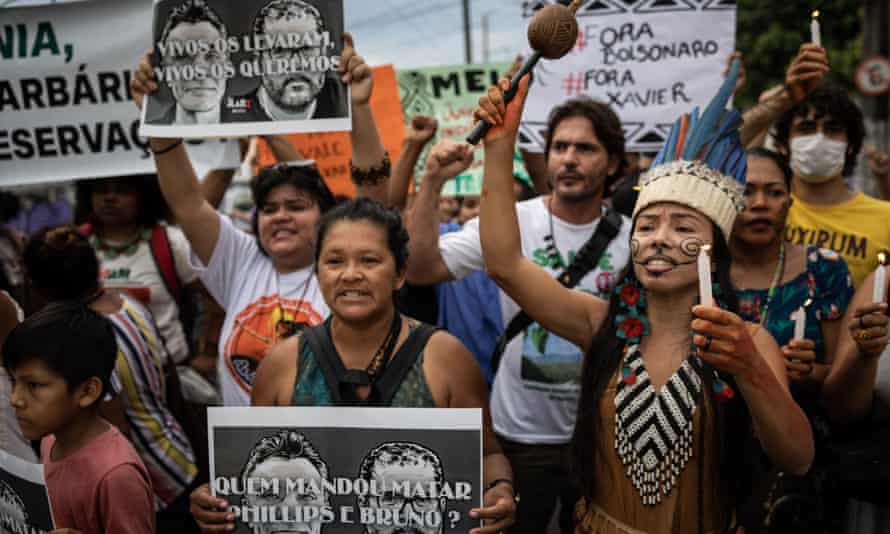
Police in the Brazilian Amazon have found the bodies of two men in the area close to where British journalist Dom Phillips and Indigenous activist Bruno Pereira went missing 10 days ago.
At a press briefing late on Wednesday, regional police chief Eduardo Fontes said one of the two men arrested in connection with the pair’s disappearance had confessed to killing them.
“On Tuesday he informed us the location where the bodies were buried and he promised to go with us today to the site so we could confirm where the bodies were buried,” Fontes told reporters.

The disappearance of Dom Phillips and Bruno Pereira
The announcement brought a sad end to a 10-day search which has horrified the nation and underlined the growing dangers faced by those who dare to defend Brazil’s environment and Indigenous communities, which have faced a historic assault under the country’s far-right president, Jair Bolsonaro.
The location identified by the suspect was 1hr 40min by boat from the river town of Atalaia do Norte and another 3.1km (1.9 miles) by foot into dense forest.
After a day-long operation, involving the army, navy and police force, the Guardian witnessed the bodies being removed from that area, known as the Lago do Preguiça, under the cover of darkness.
Escorted by army troops, they were carried by boat back down the River Itaquaí to Atalaia do Norte, where Phillips and Pereira had begun their final journey.
Scores of locals flocked to the town’s port to watch as officers in camouflage gear loaded the two black body bags on to the back of a federal police vehicle, which set off in a blaze of red and blue lights.
“We are now going to identify the human remains with the most dignity possible,” Fontes said. “When the remains are proved to be those of Dom Phillips and Bruno Pereira, they will be delivered to the families.”
The news was greeted with relief by Phillips’ wife Alessandra Sampaio.
“Although we are still awaiting definitive confirmations, this tragic outcome puts an end to the anguish of not knowing Dom and Bruno’s whereabouts,” she wrote in a statement. “Now we can bring them home and say goodbye with love.
“Today, we also begin our quest for justice. I hope that the investigations exhaust all possibilities and bring definitive answers on all relevant details as soon as possible.”
 Superintendent Eduardo Alexandre Fontes speaking during a press conference in Manaus, Amazonas state. Photograph: Ricardo Oliveira/AFP/Getty Images
Superintendent Eduardo Alexandre Fontes speaking during a press conference in Manaus, Amazonas state. Photograph: Ricardo Oliveira/AFP/Getty ImagesFontes said search teams planned to return to the site on Thursday to locate the men’s boat. The men were last seen travelling upriver and Fontes alleged the suspects tossed the boat’s engine in the river and then filled the vessel with sacks of earth so it would sink.
“We are still investigating,” he said, adding that more arrests were expected. “This was a significant advance.”
The press conference was held in Manaus, the capital of Amazonas state, where a series of military and police officials congratulated themselves for the work done, before belatedly recognising the role played by Indigenous people who helped lead the search.
In Atalaia do Norte, Eliseio Marubo, an Indigenous lawyer and close friend of Pereira said: “I feel an indescribable pain because I have lost a brother, I have lost part of my story.”
Tears rolling down his cheeks, Marubo sent a message to the families of the two men who had both sought to champion the Indigenous cause. “You are not alone,” he said. “We will march on together.”

Demonstrators light candles in front of the headquarters of the National Indian Foundation (FUNAI), during a protest against the disappearance of Bruno Pereira and Dom Phillips. Photograph: Raphael Alves/EPA
Phillips, 57, and Pereira, 41 went missing on 5 June, at the end of a four-day trip down the Itaquaí river in the far west of Brazil.
Pereira was accompanying Phillips on a reporting trip for a book about sustainable development in the Amazon but their boat did not arrive as scheduled at Atalaia do Norte, not far from Brazil’s border with Peru.
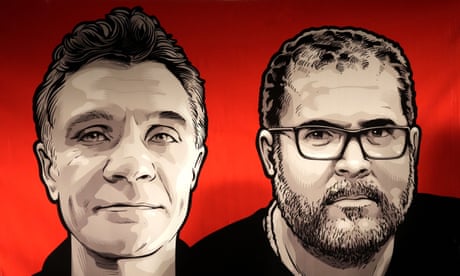
The writer and the activist: how Dom Phillips and Bruno Pereira bonded over the Amazon
However, when Pereira’s friends raised the alarm, Brazilian authorities were slow to respond and it was the Indigenous communities that made the first unsettling discovery on Saturday when they found rucksacks, clothing and personal items belonging to the two men.
Police detained one man on Wednesday, Amarildo da Costa de Oliveira, and six days later they arrested his brother Oseney and charged him with “alleged aggravated murder”. One of the men gave police the testimony that lead to the gruesome find.
The investigation was dogged by setbacks, from the sluggish response of the army and navy search teams, to the heavily criticised actions of the Brazilian embassy in London, who told Phillips’ family in the UK that his body had been found, only to retract the statement later.
It also comes amid widespread criticism of Brazil’s policies on the environment and the estimated 235 Indigenous tribes living in Brazil.
Deforestation has soared under Bolsonaro, and government agencies devoted to protecting the environment and Indigenous communities have been undermined.
Pereira was a senior figure in the state Indigenous foundation charged with protecting Indigenous communities but was removed from office in late 2019 after he led an operation to destroy illegal mines operating on Indigenous land.
He later began working with Indigenous rights organisations in remote areas of the rainforest to help them map their territories and protect them from invasions by miners, loggers, and drug-traffickers active in the area.
Late on Wednesday, Brazil’s former president Luiz Inácio Lula da Silva said in a statement that Wednesday’s news had prompted “pain and indignation” and linked the crime to the dismantling of policies to protect Indigenous people.
“Democracy and Brazil can no longer tolerate violence, hatred and contempt for the values of civilisation,” he said. “Bruno and Dom will live in our memory – and in the hope of a better world”.
A crowdfunding campaign has been launched to support the families of Dom Phillips and Bruno Pereira. Donate here in English or here in Portuguese.
Phillips, 57, and Pereira, 41 went missing on 5 June, at the end of a four-day trip down the Itaquaí river in the far west of Brazil.
Pereira was accompanying Phillips on a reporting trip for a book about sustainable development in the Amazon but their boat did not arrive as scheduled at Atalaia do Norte, not far from Brazil’s border with Peru.

The writer and the activist: how Dom Phillips and Bruno Pereira bonded over the Amazon
However, when Pereira’s friends raised the alarm, Brazilian authorities were slow to respond and it was the Indigenous communities that made the first unsettling discovery on Saturday when they found rucksacks, clothing and personal items belonging to the two men.
Police detained one man on Wednesday, Amarildo da Costa de Oliveira, and six days later they arrested his brother Oseney and charged him with “alleged aggravated murder”. One of the men gave police the testimony that lead to the gruesome find.
The investigation was dogged by setbacks, from the sluggish response of the army and navy search teams, to the heavily criticised actions of the Brazilian embassy in London, who told Phillips’ family in the UK that his body had been found, only to retract the statement later.
It also comes amid widespread criticism of Brazil’s policies on the environment and the estimated 235 Indigenous tribes living in Brazil.
Deforestation has soared under Bolsonaro, and government agencies devoted to protecting the environment and Indigenous communities have been undermined.
Pereira was a senior figure in the state Indigenous foundation charged with protecting Indigenous communities but was removed from office in late 2019 after he led an operation to destroy illegal mines operating on Indigenous land.
He later began working with Indigenous rights organisations in remote areas of the rainforest to help them map their territories and protect them from invasions by miners, loggers, and drug-traffickers active in the area.
Late on Wednesday, Brazil’s former president Luiz Inácio Lula da Silva said in a statement that Wednesday’s news had prompted “pain and indignation” and linked the crime to the dismantling of policies to protect Indigenous people.
“Democracy and Brazil can no longer tolerate violence, hatred and contempt for the values of civilisation,” he said. “Bruno and Dom will live in our memory – and in the hope of a better world”.
A crowdfunding campaign has been launched to support the families of Dom Phillips and Bruno Pereira. Donate here in English or here in Portuguese.
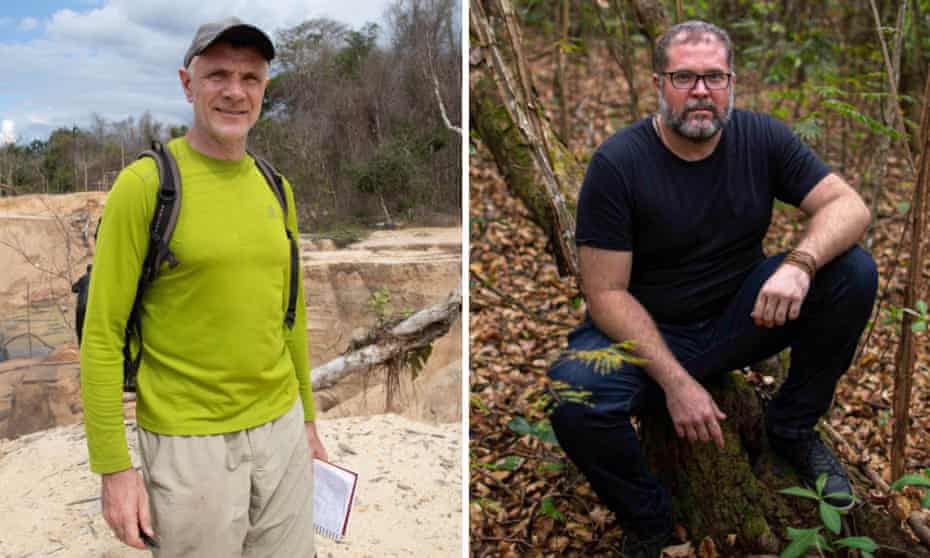
No comments:
Post a Comment